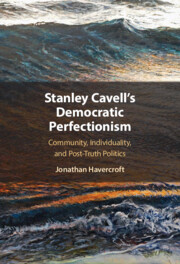Book contents
- Stanley Cavell’s Democratic Perfectionism
- Stanley Cavell’s Democratic Perfectionism
- Copyright page
- Contents
- Acknowledgments
- Abbreviations
- Introduction
- 1 The Claiming of Community
- 2 Stanley Cavell as Methodologist
- 3 Two Kinds of Agreement in Democratic Theory
- 4 The Politics of Tragedy, Recognition, and Acknowledgment
- 5 Film, Gender, Gaslighting
- 6 The Limits of Democratic Perfectionism
- Conclusion
- Bibliography
- Index
Conclusion
Published online by Cambridge University Press: 17 August 2023
- Stanley Cavell’s Democratic Perfectionism
- Stanley Cavell’s Democratic Perfectionism
- Copyright page
- Contents
- Acknowledgments
- Abbreviations
- Introduction
- 1 The Claiming of Community
- 2 Stanley Cavell as Methodologist
- 3 Two Kinds of Agreement in Democratic Theory
- 4 The Politics of Tragedy, Recognition, and Acknowledgment
- 5 Film, Gender, Gaslighting
- 6 The Limits of Democratic Perfectionism
- Conclusion
- Bibliography
- Index
Summary
When I finished the first draft of this book, a colleague commented that it “reads very 2020,” by which she meant the focus on post-truth politics as a manifestation of skepticism seemed to be responding to the concerns of the political polarization of the Trump era. As I write this conclusion in early 2022, Trump is gone from the White House, but the problems of post-truth politics only seem to be intensifying. As I finished the first draft of the book, post-truth politics focused on the dismissal of “fake news,” denial of climate science, and distrust about the severity of the Covid-19 pandemic. Since then post-truth political discourse has expanded to include new fault-lines around vaccine “skeptics” and the denial over Biden’s victory in the 2020 election. Whether the intensification of post-truth politics is being driven by social media or increased political polarization or an increased distrust of expertise and elites, it seems we are now firmly in a political era where we, as a polity, cannot even agree on the basic facts around our shared reality.
- Type
- Chapter
- Information
- Stanley Cavell's Democratic PerfectionismCommunity, Individuality, and Post-Truth Politics, pp. 247 - 252Publisher: Cambridge University PressPrint publication year: 2023



